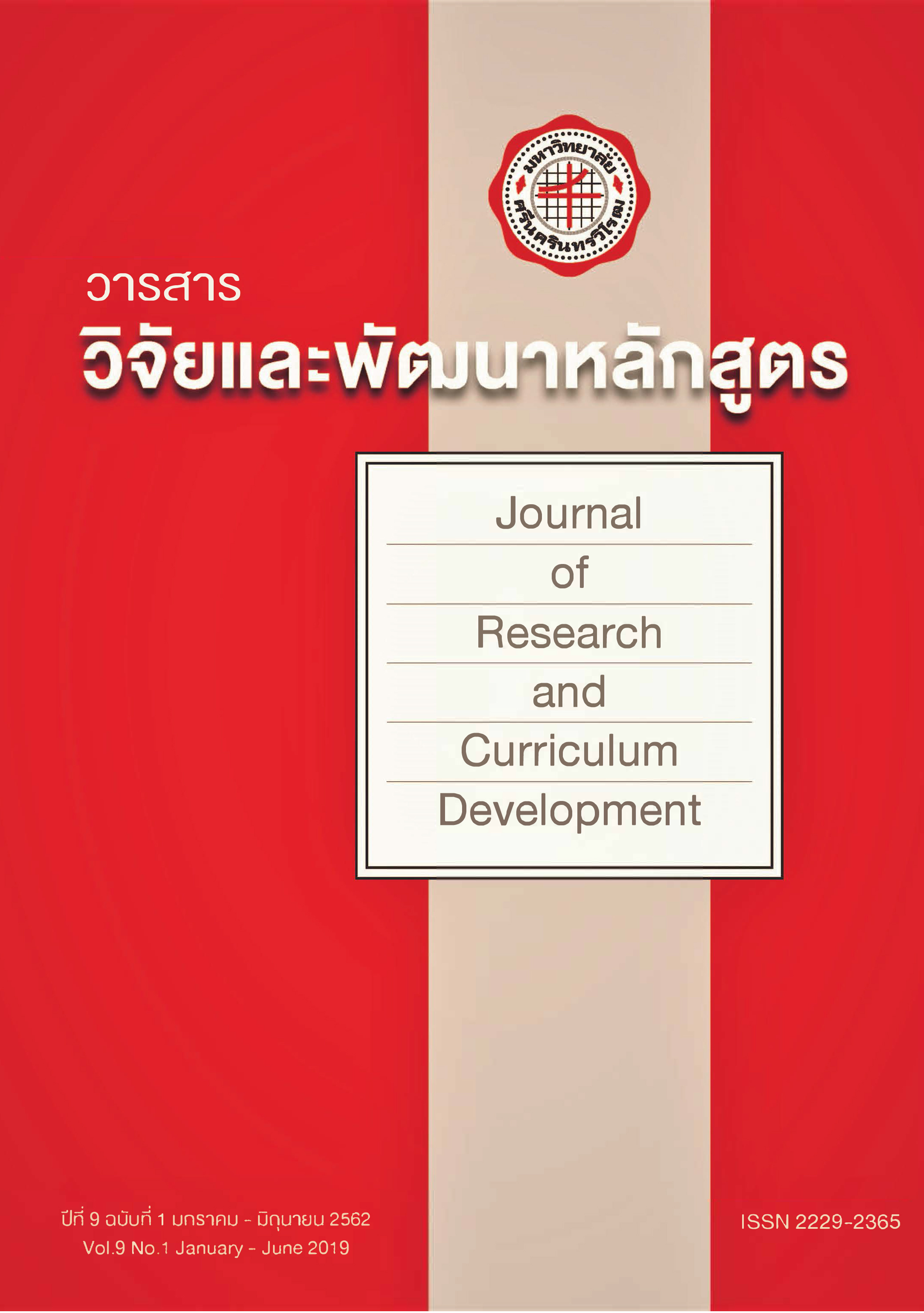การพัฒนารูปแบบความสัมพันธ์โครงสร้างเชิงเส้น ของปัจจัยที่ส่งผลต่อการขาดขวัญและกำลังใจในการปฏิบัติงานของครูสังกัดสำนักงานคณะกรรมการการศึกษาขั้นพื้นฐานในภาคตะวันออก
Keywords:
Development model, Linear relationship, Morale and effort teacherAbstract
This research was carried out by mixed method aiming to 1) analyze factors effecting on lack of morale and effort of teacher performance under the office of Basic Education Commission in Eastern region, 2) develop and monitor in accordance with linear relationship model of factors effecting on lack of morale and effort of teacher performance under the office of Basic Education Commission in Eastern region and complying with empirical information, and 3) seek for a guideline for supporting morale and effort of teacher performance under the office of Basic Education Commission in Eastern region. The research was dived into 3 steps : Step 1, Study of literature review of concepts theories and related researches; Step 2; Development of linear relationship model of factors effecting on lack of morale and effort of teacher performance under the office of Basic Education Commission in Eastern region by questioning teachers about opinions concerning factors effecting on lack of morale and effort of teacher performance under the office of Basic Education Commission in Eastern region by using 5 threshold–questionnaire. Samples used were 600 teachers which were selected by multistage stage sampling. Then data were analyzed to compare the accordance between theoretical linear relationship and data receiving from the samples by using program package and Step 3; Group discussion with experts in order to seek for a guideline to support morale and effort of teacher performance under the office of Basic Education Commission in Eastern region.
The results showed that
- Factors effecting on lack of morale and effort of teacher performance under the office of Basic Education Commission in Eastern region were caused by 1) administrator’s leadership and 4) organizational fairness / justice.
- Result of development of linear relationship model of factors effecting on lack of morale and effort of teacher performance under the office of Basic Education Commission in Eastern region was conformed to empirical information with statistical value of =172.08 ; df =187 ; p – value = 0.776 ; = 0.920 ; CFI = 1.00 ; GFI = 0.98 ; AGFI = 0.96 ; SRMR = 0.03 ; RMSEA = 0.00 All the 4 factors had either overall or direct effects on morale and effort of teacher performance under the office of Basic Education Commission in Eastern region and some of them had also indirect effects.
3. Guideline to promote morale and effort of teacher performance under the office of Basic Education
Commission in Eastern region found were 1) using power for offering incentive, administrator should
offer incentive or praise teachers, support them for their career progress by ways of training,
conference, seminar or further study, 2) reinforcing staff’s performance, they should be encouraged to
gain additional knowledge, to have skill acquisition, to seek new technology and create now techniques
for working process 3) for commanding leadership, administrators should give opportunity for them to
express their points of view, apply ingenious order, standard, criteria or regulations for duty and 4) for
reward organization should base upon fairness and equality, set up an unbiased procedure for working
return, and stick to 3 dimensional criteria – outcomes, working behavior and work potential of
personnel.
References
จักรพันธ์ ชูกลิ่น.(2558). ความสัมพันธ์ระหว่างภาวะผู้นำและการใช้อำนาจของผู้บริหารสถานศึกษา
สังกัดสำนักงานเขตพื้นที่การศึกษาประถมศึกษากระบี่. หลักสูตรการศึกษามหาบัณฑิต สาขาวิชาการบริหารการศึกษา
คณะศึกษาศาสตร์ มหาวิทยาลัยบูรพา.
ทวี จันทเพ็ชร์.(2550). ขวัญและกำลังใจในการปฏิบัติงานโรงงานปุ๋ยศิริจันทร์. วิทยานิพนธ์ปริญญาบริการธุรกิจมหาบัณฑิต
สาขาการจัดการทั่วไป มหาวิทยาลัยราชภัฏพระนคร.
ทิพวรรณ มะเจียกจร.(2557). ความสัมพันธ์ระหว่างภาวะผู้นำการเปลี่ยนแปลงของผู้บริหารสถานศึกษากับวัฒนธรรมองค์กร
ของสถานศึกษาในสังกัดเทศบาลนครสมุทรสาคร. หลักสูตรปริญญาศึกษาศาสตรมหาบัณฑิต สาขาวิชาเทคโนโลยีการบริหาร
การศึกษา คณะครุศาสตร์อุตสาหกรรม มหาวิทยาลัยเทคโนโลยีราชมงคลธัญบุรี.
นพรัตน์ นาคบาง.(2556). ภาวะผู้นำที่มีความสัมพันธ์กับขวัญและกำลังใจในการปฏิบัติงานของบุคลากร
มหาวิทยาลัยสุโขทัยธรรมาธิราช. หลักสูตรปริญญาบริหารธุรกิจมหาบัณฑิต วิชาเอกการจัดการทั่วไป คณะบริหารธุรกิจ
มหาวิทยาลัยเทคโนโลยีราชมงคลธัญบุรี.
บงกช ยิ้มหนองโพธิ์. (2558). พลังอำนาจของผู้บริหารสถานศึกษาที่ส่งผลต่อขวัญกำลังใจของครูในสถานศึกษา สังกัดสำนักงานเขต
พื้นที่การศึกษาประถมศึกษานครปฐม เขต 1.วิทยานิพนธ์ ครุศาสตรมหาบัณฑิต สาขาวิชาการบริหารการศึกษา
บัณฑิตศึกษามหาวิทยาลัยราชภัฏนครปฐม.
ประจักษ์ ทามี.(2558). ความสัมพันธ์ระหว่างภาวะผู้นำการเปลี่ยนแปลงของผู้บริหารกับวัฒนธรรมองค์กร
ลักษณะสร้างสรรค์ของโรงเรียนในจังหวัดนครพนม. สาขาการบริหารการศึกษา คณะศิลปศาสตร์และวิทยาศาสตร์
มหาวิทยาลัยนครพนม.
ปรียาพร วงศ์อนุตรโรจน์. (2551). จิตวิทยาการบริหารงานบุคคล. กรุงเทพฯ: พิมพ์ดี.
ปรึกษา ณีสูงเนิน.(2555). วัฒนธรรมองค์การที่ส่งผลต่อขวัญกำลังใจของครูในโรงเรียนสังกัดองค์การบริหาร
ส่วนจังหวัดนครราชสีมา. หลักสูตรศึกษาศาสตรมหาบัณฑิต สาขาวิชาการบริหารการศึกษา มหาวิทยาลัยเซนต์จอห์น.
ศิริภัทร ดุษฎีวิวัฒน์.(2555). ภาวะผู้นำที่มีผลต่อขวัญและกำลังใจในการปฏิบัติงานของพนักงานธนาคาร
ออมสินสำนักงานใหญ่. หลักสูตรบริหารธุรกิจมหาบัณฑิต คณะบริหารธุรกิจ มหาวิทยาลัยเทคโนโลยีราชมงคลธัญบุรี.
สุรศักดิ์ วงศ์จำปา.(2558). ความสัมพันธ์ระหว่างการรับรู้ความยุติธรรมในองค์การกับแรงจูงใจในการ
ปฏิบัติงานของข้าราชการครูสังกัดสำนักงานเขตพื้นที่การศึกษาประถมศึกษาร้อยเอ็ด เขต 3. หลักสูตรครุศาสตรมหาบัณฑิต สาขาวิชาการบริหารการศึกษา มหาวิทยาลัยราชภัฏร้อยเอ็ด.
DeConinck, B. J. and C. D. Stilwel.(2004). “Incorporating Organizational Justice, Role
States, Pay Satisfaction and Supervisor Satisfaction in a Model of Turnover
Intention,” Journal of Business Research. 57 : 225 – 231.
Duckworth, L. E. (2005). The relationship between self-perceived power Base of
participants of the center for leadership training program and 360-degree feedback evaluation fromcolleagues. n.p.
Fisher, C., & B.A. Locke. (1992). The New Look in Job Satisfaction Theory and Research.
New York : Lexington Books.
Hendrix, William H.; et al. (1998). Effects of Procedural and Distributive Justice on Factors
Predictive of Turnover. Journal of Social Behavior and Personality. 13(4): 611-632.
Steven, P.D., & Rogers, R. W. (1986). Protection motivation theory and preventive health: beyond
the health belief model. Health Education Research, 1 (30), 153-161.
Wong, Y. T., H. Y. Ngo and C. S. Wong. (2006).“Perceived Organizational Justice, Trust
and OCB : A Study of Chinese Workers in Join to Ventures and State-Owned
Enterprises,” Journal of World Business. 41 : 344 – 355.
Yukl, G. (1994). Leadership in Organization (3rd ed.). New Jersy: Prentice Hall
International.


